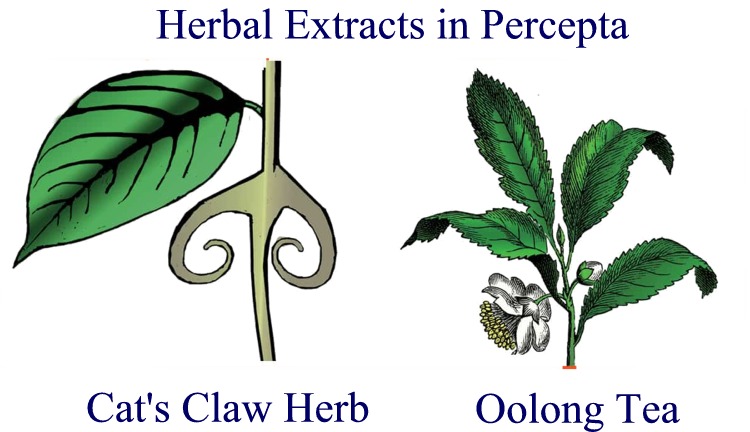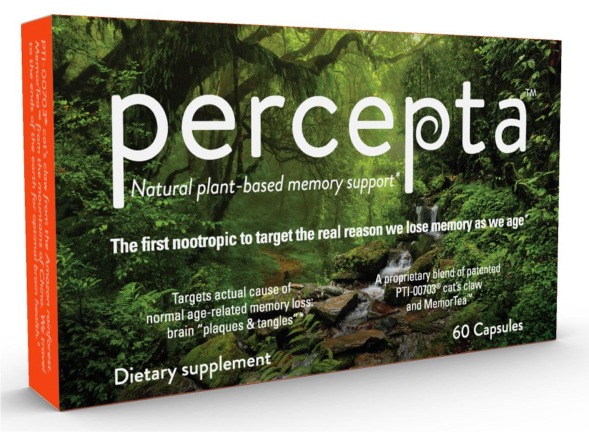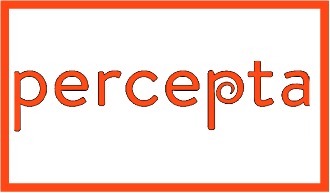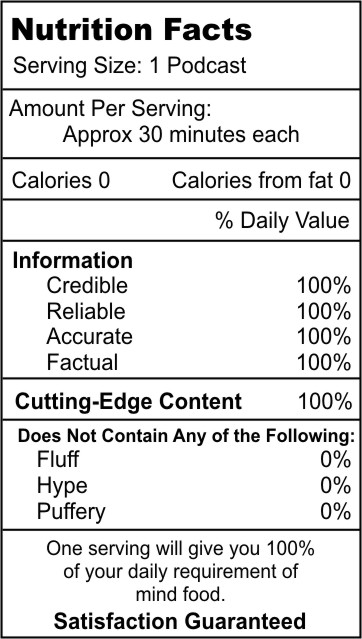Podcast: Play in new window | Download (Duration: 49:29 — 90.7MB)
Percepta™ targets plaques and tangles in the aging brain.*

If you are interested in supporting memory, cognition, and even addressing some of the most challenging issues in the aging brain, then you will be interested in this podcast. This interview with Dr. Alan Snow will give you some insight into how this novel nutritional product came to the marketplace. Consumers seldom consider the development of products. How do we know when a nutrient is effective? How do we know it is safe? How do we know that one particular form is the best, maybe even better than synthetic drugs?
This interview will be an excellent illustration of how powerful natural products are discovered and developed into effective health supporting supplements. This doesn’t happen in a vacuum. And it doesn’t happen by accident. In this case, it is because two brilliant scientists discovered that nature may hold the secret to preserving memory as we age.
Percepta™ co-founders are neuroscientists who each bring over 30 years of dedication to brain health, brain aging and brain aging research. Dr. Snow is an inventor with 18 National Institute of Health Awards and over 340 issued patents. Dr. Tanzi is a Harvard University Professor, the Director of the Genetics and Aging Research Unit at Massachusetts General Hospital, the Chairman of the Cure Alzheimer’s Fund, and he co-discovered all three early-onset Alzheimer’s disease genes.
Dr. Snow has been studying and researching brain health, memory, cognition and brain “plaques and tangles” for over 30 years. He recently published an article at Scientific Reports (a Nature online access journal). This paper is available by Open Online Access at the following URL: https://www.nature.com/articles/s41598-019-38645-0
Here is an excerpt from the press release.
“EDMONDS, Wash., Feb 7, 2019 /PRNewswire/ — Scientific Reports published a landmark and detailed research paper this week entitled, “The Amazon rain forest plant Uncaria tomentosa (cat’s claw) and its specific proanthocyanidin constituents are potent inhibitors and reducers of both brain plaques and tangles.” This research, spanning over a ten-year period, was led by renowned brain aging and Alzheimer’s disease researcher Dr. Alan Snow and a host of notable colleagues from eight different institutions. The paper has immediate implications for a natural alternative solution for the support of normal brain aging.” End excerpt.
The Real Cause of Memory Loss
- The human brain is the most complex organ in the body, with about 100 billion nerve cells firing and connecting to help your brain function throughout the day. Starting in early adulthood, though, our brains slowly start to deteriorate.
- The first protein, beta-amyloid protein, can accumulate to form “plaques,” which cause a decline in hippocampus-dependent memory and cognition in the brain.
- The second protein, called tau protein, causes “tangles” to accumulate inside neurons, causing them to die.
- The more these “plaques and tangles” accumulate in your brain, Snow says, the worse your memory, focus, concentration and cognition will be.
His statement on the benefits of Percepta™ is very powerful. Dr. Alan Snow, lead author of this paper states: “I have been working in the drug development field for brain aging for over 30 years and have never seen a more potent inhibitor of both plaques and tangles than the natural plant-based PTI-00703 cat’s claw that we discovered.” Here are some of the study results:
- “A specific Amazonian rain forest plant extract, known as PTI-00703 cat’s claw (Uncaria tomentosa) has been identified as a potential alternative natural solution to inhibit and reduce both brain plaques and tangles
- Brain aging includes the accumulation of beta-amyloid protein containing plaques and tau protein containing tangles that have been shown in numerous peer-reviewed publications to contribute to accelerated memory loss and cognitive decline
- PTI-00703 cat’s claw from the Amazon rain forest is extracted using a specific proprietary methodology resulting in the most robust form of cat’s claw to effectively target brain plaque and tangle accumulation
- PTI-00703 cat’s claw is obtained from Uncaria tomentosa (one of 34 species of cat’s claw) and represents the bark powder from the Amazon woody vine that grows up to 100 feet in length. The woody vine regrows after it is harvested thereby replenishing the source of this important plant
- PTI-00703 cat’s claw demonstrated both the ability to inhibit formation and reduce/dissolve beta-amyloid protein plaque fibrils and tau protein tangles. The dissolution in most cases occurred instantly
- The main constituents of PTI-00703 cat’s claw were shown to enter the brain within 2 minutes of being in the blood
- A major polyphenol ingredient in PTI-00703 cat’s claw (known as proanthocyanidin B2) reduced brain plaques in older transgenic mice by ~52-58% and in younger transgenic mice by ~74-83% over a 3-month period
- Reduction of brain plaques in transgenic mice over this 3-month period also led to a marked ~58% improvement in short-term memory
- The constituents in PTI-00703 cat’s claw discovered to be responsible for the plaque and tangle inhibitory activity include specific polyphenols, known as proanthocyanidins. Proanthocyanidins are also found in teas, red wine, grape seed extract, blueberries, cranberries, black berries, black currant, strawberries and cocoa beans

The mechanism of action elucidated in our paper includes PTI-00703 cat’s claw main ingredients entering the brain rapidly; directly binding with beta-amyloid protein fibrils (in plaques) and tau protein twisting-filaments (in tangles). Studies also indicated that the major polyphenol ingredients in PTI-00703 cat’s claw serve as a small wedge to unzip and unravel insoluble plaque fibrils and tau tangles, causing them to fall apart. The non-toxic resulting debris is then believed to be cleaned up by the scavenger cells of the brain (i.e. microglia) resulting in less plaques and tangles, thereby improving memory. End Excerpt.
IMPORTANT NOTE: I have discussed many times the importance of using the clinically studied and trademarked supplements. This is the only way that you can reasonable expect the same results. There are many species of cat’s claw and only one is the right one. And contained within that cat’s claw herb are the specific compounds identified by Dr. Snow. You only get this in Percepta™ by Cognitive Clarity.
Tangles and plaque formations are a part of the normal brain process as we age.*
Percepta is postulated to inhibit and reduce plaques and tangles in the normal aging brain *
I suggest that you check out the website. If you are willing to spend some time exploring the resources at PerceptaBrain.com you will become as excited as I am about the potential benefits. They are huge.
About Dr. Alan Snow
Dr. Alan Snow is one of the world’s most renowned brain aging and Alzheimer’s disease authorities. He is former Research Associate Professor of Pathology at the University of Washington in Seattle, where he was an Alzheimer’s Disease Research Center project team leader for over 10 years. Dr. Snow has published extensively about brain plaques and tangles and was the first to discover the presence of heparan sulfate proteoglycans (HSPGs) in Alzheimer’s disease and prion diseases, and has shown HSPGs to have an important role in the initiation of Alzheimer’s disease and a host of other amyloid disorders. He is an inventor on 340 issued patents, a recipient of a LEAPS award from the Michael J. Fox Foundation for Parkinson’s Disease Research, and a recipient of 18 National Institute of Health grant awards including grants to identify new plaque and tangle inhibitors. Dr. Snow has been studying brain aging, memory loss, and brain plaques and tangles for over 30 years and presently serves as founder and CEO of Edmonds, Washington-based Cognitive Clarity Inc.













{ 0 comments… add one now }